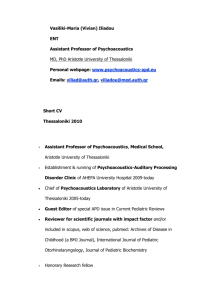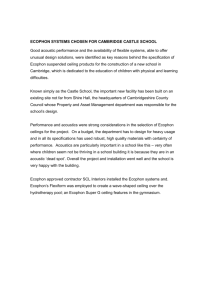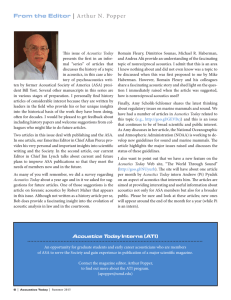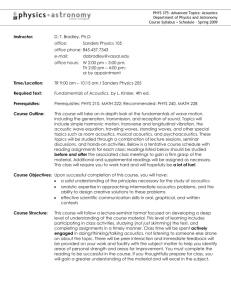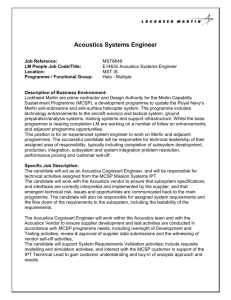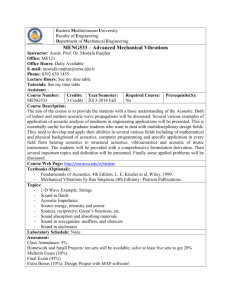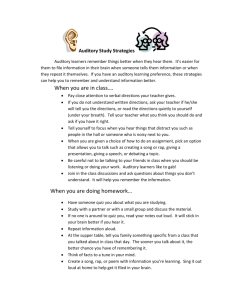CS5611 Acoustics and Psychoacoustics
advertisement
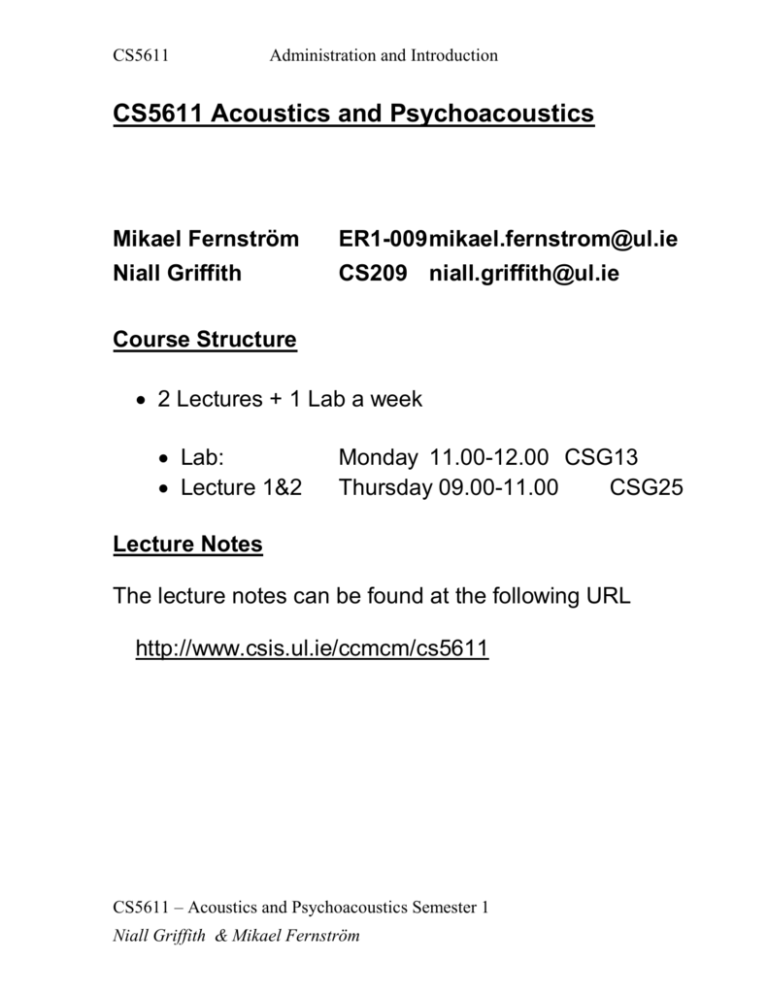
CS5611 Administration and Introduction CS5611 Acoustics and Psychoacoustics Mikael Fernström ER1-009 mikael.fernstrom@ul.ie Niall Griffith CS209 niall.griffith@ul.ie Course Structure 2 Lectures + 1 Lab a week Lab: Lecture 1&2 Monday 11.00-12.00 CSG13 Thursday 09.00-11.00 CSG25 Lecture Notes The lecture notes can be found at the following URL http://www.csis.ul.ie/ccmcm/cs5611 CS5611 – Acoustics and Psychoacoustics Semester 1 Niall Griffith & Mikael Fernström CS5611 Administration and Introduction Assessment CS5611 is assessed through Assignment + Exam. The assignment 50% of the course mark. There is a 10% penalty per day for late delivery of assignments i.e. you loose 5% of the course mark per day – except if you have a really good excuse. The assignment is only repeatable (at the discretion of the lecturer) if you have an I grade. The exam 5 questions to answer -- 3 psychoacoustic, 2 acoustic 50% of the course mark. If you have to repeat the exam (Grade F compulsory, D2, D1 optional) then the exam is 100% of the course mark. The highest grade attainable in a repeat is C3. The assignment will be set in week 7 and will be due at the end of week 12/13. The exact dates will given by Mikael Fernström when the assignment is specified. CS5611 – Acoustics and Psychoacoustics Semester 1 Niall Griffith & Mikael Fernström CS5611 Administration and Introduction Reading list Principal text Howard, D.M. & Angus J. (1996) Acoustics and Psychoacoustics. Focal Press. (Library) Other relevant texts Bregman, A.S. (1990) Auditory Scene Analysis, MIT Press (Library) Cook, P. R. (1999) Music Cognition and Computerized Sound, MIT Press. (Library) David Butler (1992) The Musician’s Guide to Perception and Cognition, Schirmer Books Gaver, W. W. (1993). "What in the world do we hear? An ecological approach to auditory source perception." Ecological Psychology 5(1): 1-29. Gaver, W. W. (1993). "How do we hear in the world? Explorations of ecological acoustics." Ecological Psychology 5(4): 285-313. Handel, S. (1989) Listening MIT Press (Library) McAdams S and Bigande E. (1993) Thinking In Sound. OUP (Library) Moore B.C.J. (1997) An Introduction to the Psychology of Hearing. Academic Press (Library) Pickles J.O. (1982) An Introduction to the Physiology of Hearing. Academic Press. (out of print) Rosen, S. & Howel, P. (1991) Signals and Systems for Speech and Hearing. Academic Press. Wallin N. (1991) Biomusicology. Pendragon Press (Library) CS5611 – Acoustics and Psychoacoustics Semester 1 Niall Griffith & Mikael Fernström CS5611 Administration and Introduction Course Objectives To give you an understanding of the processes involved in the production, transmission, and perception of sound. Course Landmarks Week 1 7 Administration & Intro Course Outline Assessment Introduction Assignment Set 12/13 Assignment Due 13 Revision 14/15 Exam CS5611 – Acoustics and Psychoacoustics Semester 1 Niall Griffith & Mikael Fernström CS5611 Acoustics Curriculum Acoustics Nature of Sound Sound production Sound propagation and radiation Acoustics of Rooms Media Power Refraction Reflection Spatialisation, echo & reverb standing waves Stereo 3-D Audio Sound in the environment Movement Doppler effect Sound from musical instruments singing voice Critical band Masking Localization Auditory illusions Earcons Auditory Icons Sonification Virtual sound CS5611 – Acoustics and Psychoacoustics Semester 1 Niall Griffith & Mikael Fernström CS5611 Psychoacoustics Curriculum Psychoacoustics Structure of Auditory System Ear Auditory Nerve Auditory Pathway Auditory Cortex Psychophysics Of Sound Pitch Range of Hearing Sensitivity of discrimination JND Critical Bands Timbre – Sound Quality Perception of natural sounds Loudness - Intensity Localisation - Direction Auditory Scene Analysis Gestalt Principles of organisation Streaming -- Fusion and Fission Musical Cognition and Memory Musical Descriptors Pitch Scales & Melody Meter Rhythm Development of Musicality Musical Memory STM, WM & LTM Grouping & Reduction CS5611 – Acoustics and Psychoacoustics Semester 1 Niall Griffith & Mikael Fernström
